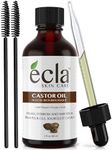Buying Guide for the Best Hair Oils
Choosing the right hair oil can make a significant difference in the health and appearance of your hair. Hair oils can provide nourishment, moisture, and protection, but with so many options available, it can be overwhelming to pick the right one. Understanding your hair type and specific needs is crucial in making the best choice. Here are some key specifications to consider when selecting a hair oil.Hair TypeHair type is one of the most important factors to consider when choosing a hair oil. Hair can be straight, wavy, curly, or coily, and each type has different needs. For example, straight hair may benefit from lighter oils like argan or jojoba, which won't weigh it down, while curly or coily hair may need heavier oils like coconut or castor to provide adequate moisture and definition. Understanding your hair type will help you select an oil that complements its natural texture and needs.
PurposeHair oils can serve various purposes, such as moisturizing, strengthening, promoting growth, or adding shine. Identifying your primary goal will help narrow down your options. For instance, if you're looking to combat dryness, oils like olive or avocado are excellent choices due to their deep moisturizing properties. If your goal is to strengthen and reduce breakage, oils rich in vitamins and fatty acids like almond or grapeseed are ideal. Knowing what you want to achieve with the hair oil will guide you to the right product.
IngredientsThe ingredients in hair oils can vary widely, and it's important to choose ones that are beneficial for your hair. Natural oils like coconut, argan, and olive are popular for their nourishing properties. Avoid oils with synthetic additives or harsh chemicals, as they can cause damage over time. Look for oils that are cold-pressed or organic, as they retain more nutrients. Reading the ingredient list will help you ensure that you're getting a high-quality product that will be gentle and effective for your hair.
Absorption RateDifferent hair oils have varying absorption rates, which can affect how they feel and perform on your hair. Light oils like grapeseed and jojoba absorb quickly and are less likely to leave a greasy residue, making them suitable for daily use or fine hair. Heavier oils like castor and olive take longer to absorb and are better for deep conditioning treatments or thicker hair types. Consider how often you plan to use the oil and your hair's tolerance for heavier products when choosing an oil with the right absorption rate.
ScentThe scent of a hair oil can be an important factor, especially if you plan to use it regularly. Some oils have a strong natural fragrance, like coconut or rosemary, while others may be more neutral or even unscented. If you are sensitive to smells or prefer a particular scent, this can influence your choice. Additionally, some oils may have added fragrances, which can be pleasant but may also cause irritation for some people. Choose a scent that you enjoy and that complements your personal preferences.
















